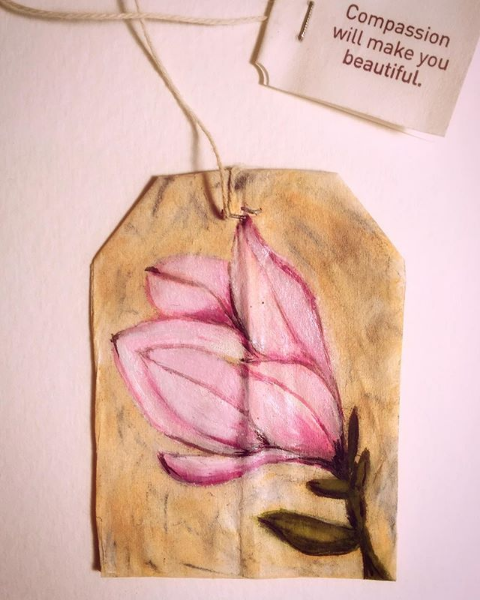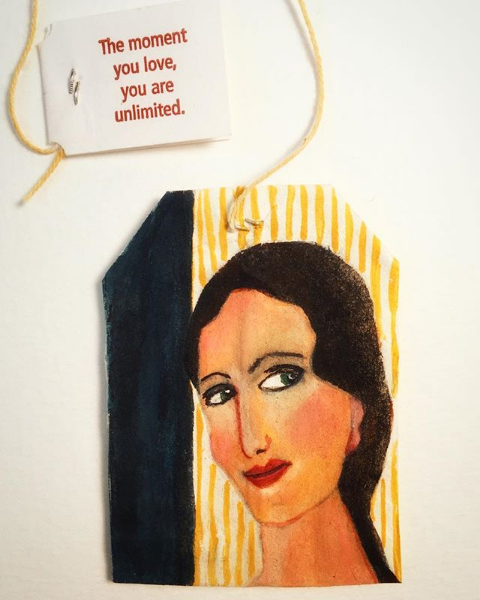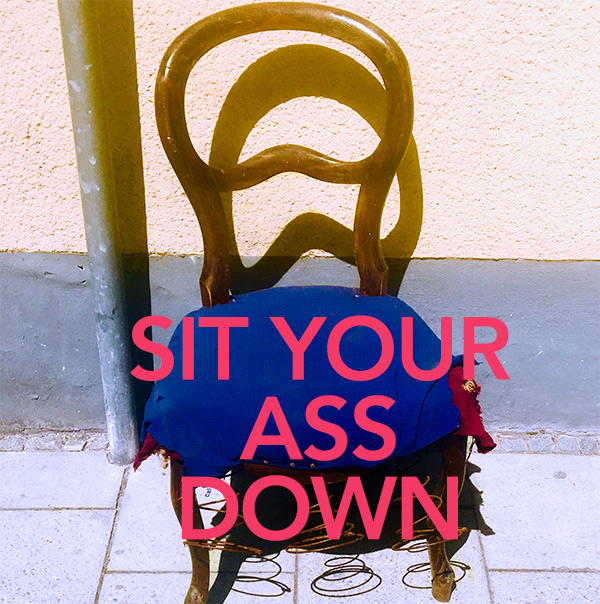Granted, we just drop in on them. My dad isn’t expecting us, and he’s hustling in his labored, jerky way to tidy for guests. This room has become my mother’s entire world. She eats there, she sleeps there, she watches TV there. It’s more cluttered now than it was on our last visit. My mom tours the house when my dad leaves on errands. She gathers up items that speak to her on these tours and brings them into the room to surround her. I spot a few Madame Alexander dolls, several stacks of past Christmas cards from family and friends, baby pictures, and pictures of her parents. On the mantle, she has hung a few outfits from the 70s, which she saved in upstairs closets because “things always come back in style.” She even has a wig on her side table.
She’ll leave the room also to sneak wine in the evening and occasionally go to the bathroom — though from the smell of the room, she’s taking full advantage of her adult undergarment. And changing it less and less.
My dad is lighting candles in an attempt to cover the odor. Rolled up under his arm is one of the two yoga mats he places under my mom’s bedding to try to keep the sofa from being saturated. He alternates them. We lobbied him to buy a proper daybed that could be covered with rubber pads and correct sheets, but he resisted. I even offered to buy it myself, but again he refused.
“Come sit down,” my mother says to me and moves her newspaper off the sofa to make room. I know better than to sit there. We are all wary of the couch. Just a few months before, my mom was breaking out in small, angry, red bites, and we kids were pretty sure it was from bed bugs. I asked my oldest brother to go by and put commercially available test kits under the sofa to see if bugs had taken up residence, but he failed to follow the very simple instructions on the box correctly and misapplied the strips. It wouldn’t have taken more than his lifting the sofa cushion my mom lies on day-in and day-out and setting one trap in each corner of the wicker. But he complained he couldn’t do it, even though he tested “very gifted or highly advanced” as a child. Said his bad back wouldn’t allow him to lift the sofa, which was not required per the directions on the box. It’s almost like he couldn’t be bothered to do it correctly. I should have asked my other less cerebral brother to do it, but he has refused to assist in any meaningful way. That one is happy to drop off oversized portions of tubes or shells and red sauce; or deliver fresh crab or salmon that his buddies catch. He likes to do the kind of helping that garners glorifying, movie-house, pipe-organ sound effects. But try to get him to do anything mundane like drive our dad to a doctor’s appointment or do a couple of loads of laundry or just go inside and visit for an hour in the sitting room, and he’s a wisp of fog. No one wants to spend time in that room; sit on that sofa.
“No, it’s okay. I’ll just stand,” I say, and I do, in the doorway, leaning on the jamb. My husband is sitting in the only other available “chair” in the room: an uncomfortable, small, carved, hardwood bench — too small for two people to sit on contentedly. Too hard and proper for any one person to sit on contentedly.
“What’s new?” my mom asks.
“Not much,” I say. “Working.”
“How’s Axel?”
“He’s okay,” I say. “You know, doing school. Working.”
“Oh, that’s good. What grade is he in now?”
“He’s a senior.”
“Is he playing baseball?”
“Not yet. The season hasn’t started.”
“And, David, how are you?”
“Oh, I’m good,” my husband says. “Working. Trying to keep up on the house.”
“Oh, are you guys doing something to the house?”
“No,” David says. “Just trying to keep it from falling down.”
“Oh, I know,” my mom says, “I’m constantly busy here with things.” Which is a lie. Well lie is a hard stamp. She is busy with things. She sits in her house coat, watches cooking shows, and drinks tea. She combs through House Beautiful and fashion magazines. She rummages through a patch of designer purses she’s planted near the sofa and rearranges colored sharpies in a tan, fabric pencil cup on her coffee table as if they’re gladiolas. In her head, she’s busy with projects all day long.
“So, how are you?” she’s turning again to me.
“I’m fine,” I repeat. “Working.”
“Where are you working now?” she asks. I resist the urge to shout The same damn place I’ve been working for the last eleven years! Key Systems! In logistics!
Instead I say, “My same old job at Key.”
“Fun, fun, fun,” she says. “I don’t miss working. I mean I loved it — parts of it. I really did. The people. But I’d rather stay home and drink tea!” She laughs a little bit and shakes her hair out of her eyes. Her hair has grown long. I’d never seen it past the occipital bone of her skull, and now it rests beyond her shoulder blades. She seems to be brushing it. It all runs in one direction. It has a nice flow with no strays, but it’s five-eighths grey. My mother never skipped a color treatment in the fifty years of my conscious memory of her, nor a weekly nail appointment. Her fingernails are unpolished, overgrown, and thick. Dirt is embedded in her nails’ free edges. I can only imagine what her toenails look like. I shudder.
“Come sit down,” she asks me again and pats the space next to her on the sofa.
“No, I’m okay. My back kind of hurts. It feels better to stand,” I say.
I hear my dad starting a load of laundry, likely the bedding he just pulled off the sofa. Then I hear him making more tea in the kitchen. In a moment he appears with a steaming mug and places it on the table in front of my mother and lowers himself into his armchair. That chair is always reserved for him.
“Do you want some tea?” my mom asks David and me, turning between the two of us. “Coffee?”
I lift the coffee I purchased on the way to the house and say, “No, I have one.”
“David?” she asks.
He reminds her he doesn’t drink coffee.

The room is stuffy. It has only one window that can be opened — a small slider high up on the room’s east side, above the upright piano which makes getting to it a challenge. It is closed. Cobwebs fill its aluminum frame, a sure sign it hasn’t been opened in weeks. The other windows are historic-pattern antiques, salvaged from my great-grandparents’ house. Made of redwood, they are three-feet long by three-and-a-half feet high. Each features a row of picket-shaped panes, interlocking with an upper row of small diamond panes, each pane supported by redwood glazing bars. They are beautiful to look at and let in lots of light, but they are stationary windows, framed in on all sides, and cannot be opened.
My grandfather and my dad added this room to our house in 1976. For 15 years it was referred to as “the new room.” Sometime when the five of us began moving out, it became “the sitting room.” I puzzle over calling it “the stinky room” now.
“Can I get you anything?” my mom asks me. She was always a great host. In fact hostessing is likely part of her neural metabolism. Under an fMRI, you would certainly see whatever part of the brain controls hosting and friendship light up if she were asked to think about guests, cooking, dinner parties, and entertaining — even though she never talks to any of her friends anymore and certainly doesn’t have people over, or go visit. She tells me she walks the neighborhood every day, but again that is make-believe. It doesn’t happen. I wonder if her brain would light up if she were asked about her children. I think it still would for some. I don’t think it ever has for me.
I tell her I don’t need anything, and she invites me to sit down again. I want to. I think it would make her less anxious. I would like to have a mother I could sit next to and put my hand on to let her know I’m there and maybe in doing so could relieve her worry. Her repetitive questions must come from fear. Her mind is running away from her, and she’s trying to control it by yanking it back like one does a dog straining on its leash. But we never had that kind of relationship. A hardness built up when I was small. A cirrhosis of the heart perhaps. Surely by the time I was six or seven. Maybe not the first time she introduced my head to the kitchen wall, but certainly by the third or fourth. Maybe not the first time she dragged me by my hair to stand me in front of a mirror to mock me for how ugly I looked crying. I probably gave her the benefit of the doubt then, thinking she’s just really mad right now; she’ll calm down. But her taunting, snarling tone and the pulling and slamming and backhanding solidified into her preferred way of relating to me.
***
Foals are born without immunity. They gain it from large immunoglobulin molecules in their mothers’ first milk, but they must nurse within 24 hours of birth to receive the benefit. After 24 hours, the foal’s stomach lining can no longer absorb these big molecules, and the window for immunity shuts.
We missed a similar window, my mom and I. Protection wasn’t handed down, and I became overly vulnerable to the ravages of the world. Turns out she was my number one vector.
But should any of that matter now? Need any of that matter?
“Do you want anything?” she asks again. “Coffee? Tea?”
If the question were “Did you want anything?” I would have an answer. But I wouldn’t share it.
I did raise the alarm once in this house that needs were going unmet. I raised it with my dad, thinking he’d be the most receptive. I used to sit on the tub and watch my dad shave when I was little. I liked watching the faces he made to get a smooth, thorough shave. He’d bubble his cheek; elongate his philtrum, that’s the cleft part under our noses, so he could shave above his lip. He’d shift his mouth from side to side to lengthen and flatten his jawline so he could run the razor without nicking himself.
I would talk about my teachers; amusing things that happened with me and my best friend Elise — maybe what went on in Elise’s family that I thought was funny like her dad walking around in his shamrock boxers; something I’d read in school or a book I was reading just because. He didn’t say much; instead spent the time listening. It was the only space in our busy household I ever shared one-on-one with my dad. It felt incubating. So one morning, I took a chance. I said to him, “Dad, I don’t think we’re being taken care of.”
He instantly stopped shaving. He didn’t turn around and instead caught my eyes in the mirror. “What do you mean you’re not being taken care of?” he asked, rinsing his razor in the water-filled sink. “Have you ever gone to school naked? Have you ever missed a meal in this house? You have a bed to sleep in every night.”
My heart slowed. My body stilled. My eyes looking up at him widened. His answer was unexpected and made me feel exposed. He was angry. Refocusing his eyes from me to his face, he began shaving again.
His tone scared me. I was talking about our emotional needs, and he went straight to our physical requirements. It was clear taking care of his children meant caring for their essentials. Being young, I wanted to take back what I’d said. I felt guilty and ashamed I’d told my dad he wasn’t providing. I hadn’t realized it wasn’t his job to look after our emotions. But then, right there, real quick, I knew. I had never felt so childish. He was setting me straight. Listening to his explanation, I was immediately swayed. I was wrong. I was being brash to expect my emotions would be nurtured. That wasn’t part of the deal. He and my mom never made that deal with us. Being parented meant having our physical needs met and nothing more. Of course they were doing their jobs. I never again questioned or expected emotional cover after that. I probably aged seven years in that one morning.

Go sit your ass down. Go sit down next to her. A dormant but still innervated part of my brain is speaking to me telling me to step toward her, but I squelch it because that’s what I was taught to do. I need my mom, but I can’t need my mom. You’re grown. You’re out on your own, married. You have a regular stream of groceries and a house with heat and your very own clothing budget. You’re taken care of.
“Bring peace. Forgive,” was the message from Stanford Catholic’s online Covid-19 Mass Sunday. I’ve taken to tuning in each week to try to soothe my anxiety. It’s one of many practices I’ve re-established to try to stay calm for my husband and my son during the pandemic. That and a lot of breathing — the new self-care.1
“Forgive not seven but seventy-seven times,” was the Gospel reading.2
I would have to engage in some real neural plasticity to bore an alternate pathway to the part of my brain that would levitate me off the door jamb, walk my legs over to a sofa redolent of uric acid to sit next to my mother, forgive her, and bring her peace. That’s a lot of neurons that haven’t fired in 50 years. You don’t just turn the key over in a vehicle like that and expect it to fire up, back out of the driveway, and go on a pleasure ride.
But I stand myself up. “Mom, can I get you some more tea?” I ask.
“Oh!” she says startled. “Yes, that’d be great.” She lifts her mug with two hands and raises it toward me. This is the cup of my blood. The blood of the new and everlasting covenant. “One stevia,” she requests. “Please. Thank you. Thank you, Tia.”
Nowhere better to start the peace process than with tea, an ancient expression of harmony with its Buddhist origin. I’m no mahatma, but service to others — taking “What about me?” out of the equation3 — is a start. And Buddhism, being 2,500 years old, has generous timelines.
IN THIS ISSUE

- UNLIMITED, by Tia Creighton
- THE APOCALYPSE TRAJECTORY, by Sam Holloway
- SIT DOWN AND RIDE, by Jonathan
- SITTING AIN’T JUST ABOUT TAKING A SEAT, by Tia Creighton
- PRESENT LIKE A BRO, by The Editors
- TOP FIVE PHRASES EVEERY ENGLISH LEARNER NEEDS TO KNOW, by The Editors
- NEW TOOL HELPS BUSINESSES TAKE A STAND, by The Editors
Notes
1 – Terri Bensinger Levy, PhD, August 2020.
2 – Matthew 18: 21-22, Saint Joseph Edition of The New American Bible, Revised Edition (New Jersey: Catholic Book Publishing Corp., various dates).
3 – Sadhguru, “Becoming a Mahatma,” https://isha.sadhguru.org/, October 2, 2013.
Images
“Compassion,” “Unlimited” — Illustrations by Ally Merkley, https://www.instagram.com/allybmerk/
